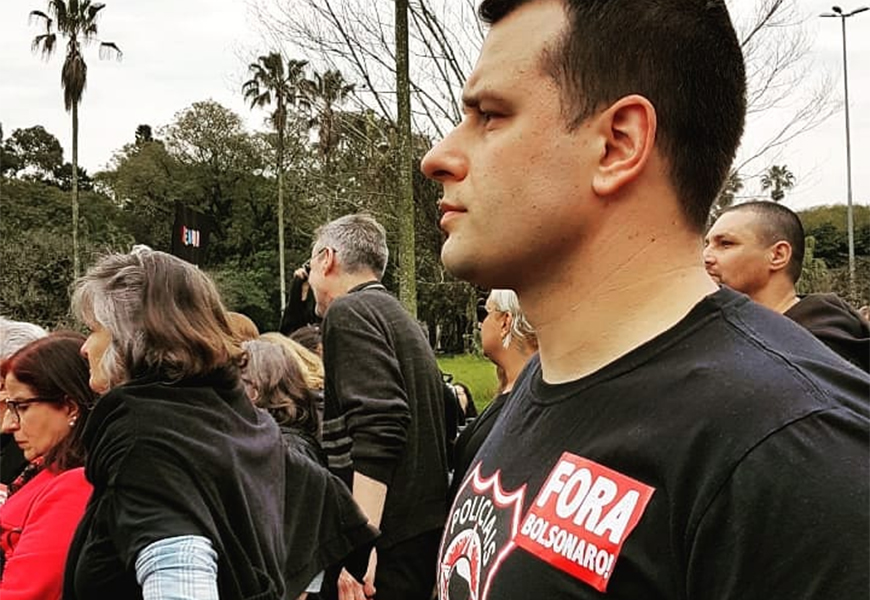RIO DE JANEIRO, BRAZIL – President Jair Bolsonaro signed on Monday, December 23rd, the Christmas pardon for public security agents who have (negligently and unintentionally) committed crimes in the exercise of their duties or as a result of them.

The decree exempts state and civil police, firemen, correctional officers, and military personnel from conviction under the decree’s provisions. It was published in the Federal Gazette on Tuesday, December 24th.
For Leonel Radde, a member of the National Anti-Fascist Police Movement, the pardon favors the militia and sends a message that abuses can be committed.
“It’s an incentive for bad police officers who will remain unpunished under the assumption that if they are acting against crime, everything is fine. It is not favoring the police, it is favoring the militia. The discourse is: I want to protect the cops so they can do their job unconcerned. But the message actually is: even if you commit abuses, if you are on my side and you pursue the policy of extermination, of persecution of the opposition, you will have my support,” explains Radde.
The police officer expresses concern over the recent events involving the Bolsonaro family and the investigations that suggest involvement with militias in Rio de Janeiro, which last week affected one of his sons, Senator Flávio Bolsonaro, more forcefully.
“Knowing of the Bolsonaro’s links with the militias and understanding that the militia acts within the police, which in some regions is equipped by these classes he pardoned, knowing all this, is a direct message, once again, to these militia groups to which he is linked in some form,” points out Leonel Radde.
Lieutenant Colonel Adilson Paes de Souza, holder of a master’s degree in Human Rights and author of the book “O Guardião da Cidade – Reflexões sobre Casos de Violência Praticados por Policiais Militares (Escrituras, 2013)”, questions the pardon’s constitutionality.
“Once again, the president is in violation of the federal constitution because it hurts the principle of impersonality. The pardon cannot be something specific to a particular category. By comparison, it would be the same thing as Temer [former President Michel Temer] pardoning cases of corruption exclusively to members of the National Congress,” Adilson says.
And he emphasizes the decree’s electoral content. “From the moment he chooses a category, I must say that once again he proves that he is governing for his electorate. The president is not acting as head of state, concerned with the fates and affairs of the nation. He’s worried about fulfilling a political campaign pledge that will reach his electorate to the detriment of society, which is extremely worrying,” he says.
The lieutenant colonel points out that the pardon includes military personnel who acted in GLO (Guarantee of Law and Order) – when the Army acts with police power – and police officers who get involved in crimes during off-hours.

A report published early last year, when Rio de Janeiro’s public safety was under federal intervention, showed that in seven years, GLOs have been deployed on nearly 30 occasions.
“The pardon is granted to off duty police officers who acted ‘according to their duties’. Unfortunately, studies show that 75 percent of homicide cases were committed off duty, in situations that evidence private security, the famous moonlighting. In other words, police officers did not act in the exercise of their duty, they acted as security guards for a certain property. It seems, to me, an encouragement of this behavior. He [Bolsonaro] doesn’t respect the rules of the game and sending this kind of signal can represent, in the minds of many police officers, a guarantee for them to continue practicing their deeds and we may experience further distress,” concludes the retired police officer.
Augusto de Arruda Botelho, a criminal attorney and one of the founders of IDDD (Institute for the Defense of the Right to Defense), a counselor for the NGO Human Rights Watch and the Innocence Project Brazil, shares Adilson Paes de Souza’s views on the decree’s constitutionality.
“The pardon is a constitutional prerogative of the president and should be based on the law and the Constitution. The president can do a lot in the Christmas pardon, but he can’t do everything,” he explains.
In his opinion, the decree has legislative and textual flaws. “He chose to pardon a class of professionals, which are the security agents. I had never seen this in my experience. There are parameters for the pardon. In addition to humanitarian, health issues, the issue where people affected by disease are usually pardoned, you need to establish macro parameters. For instance, I will pardon ‘people convicted of non-violent crimes who have already served a certain length of the sentence’. You set parameters that fit a number of convicted people, men, black women, whites, etc.,” he says.
Arruda Botelho says he was involved for some years in the pardon discussions and remembers that it is written in a first version by the National Council of Criminal and Prison Policies, the CNPCP.
“Generally the pardon text is good precisely because it has been passed through several experts. But we have to remember that the Bolsonaro emptied the CNPCP, there was all that issue of Ilona Szabó’s disconnection [the expert was invited in February by Minister Sérgio Moro to be an alternate member of the board but the president vetoed the nomination after pressure from supporters on social media], so I don’t know who drafted this pardon, but it’s dubious and it violates the principle of equality,” the criminal attorney criticizes.
He also believes that, from a political standpoint, Bolsonaro tries to signal that he has not given up many of his long-held views on public safety, including the illicit act exclusion clause, which was included in Sérgio Moro’s anti-crime package but defeated in Congress.
“I believe that this pardon by the president is an attempt to introduce a change in the law excluding culpability and punishment, altering these criteria. It is a reaction to his defeat,” concludes Augusto de Arruda Botelho.
Source: El País

